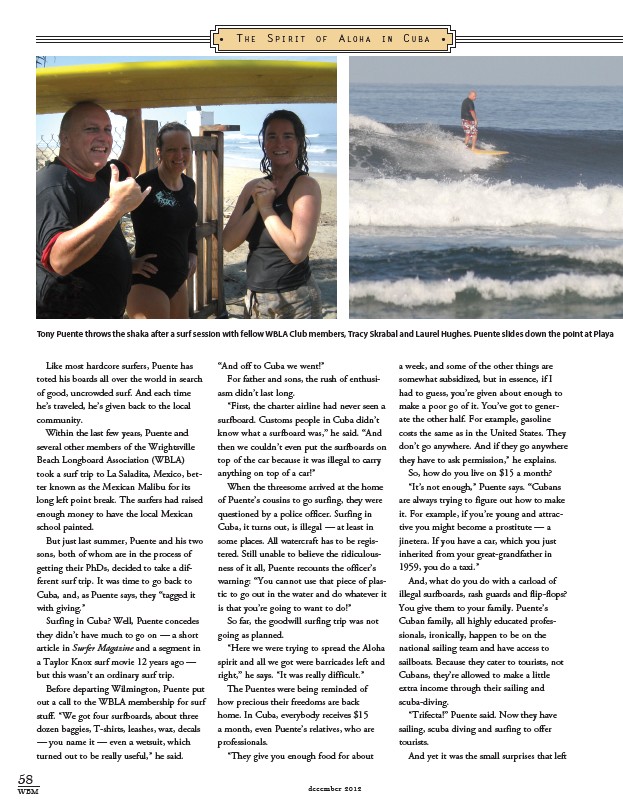
Tony Puente throws the shaka after a surf session with fellow WBLA Club members, Tracy Skrabal and Laurel Hughes. Puente slides down the point at Playa Like most hardcore surfers, Puente has
toted his boards all over the world in search
of good, uncrowded surf. And each time
he’s traveled, he’s given back to the local
community.
Within the last few years, Puente and
several other members of the Wrightsville
Beach Longboard Association (WBLA)
took a surf trip to La Saladita, Mexico, better
known as the Mexican Malibu for its
long left point break. The surfers had raised
enough money to have the local Mexican
school painted.
But just last summer, Puente and his two
sons, both of whom are in the process of
getting their PhDs, decided to take a different
surf trip. It was time to go back to
Cuba, and, as Puente says, they “tagged it
with giving.”
Surfing in Cuba? Well, Puente concedes
they didn’t have much to go on — a short
article in Surfer Magazine and a segment in
a Taylor Knox surf movie 12 years ago —
but this wasn’t an ordinary surf trip.
Before departing Wilmington, Puente put
out a call to the WBLA membership for surf
stuff. “We got four surfboards, about three
dozen baggies, T-shirts, leashes, wax, decals
— you name it — even a wetsuit, which
turned out to be really useful,” he said.
• T h e S p i r i t o f A l o h a i n C u b a •
“And off to Cuba we went!”
For father and sons, the rush of enthusiasm
didn’t last long.
“First, the charter airline had never seen a
surfboard. Customs people in Cuba didn’t
know what a surfboard was,” he said. “And
then we couldn’t even put the surfboards on
top of the car because it was illegal to carry
anything on top of a car!”
When the threesome arrived at the home
of Puente’s cousins to go surfing, they were
questioned by a police officer. Surfing in
Cuba, it turns out, is illegal — at least in
some places. All watercraft has to be registered.
Still unable to believe the ridiculousness
of it all, Puente recounts the officer’s
warning: “You cannot use that piece of plastic
to go out in the water and do whatever it
is that you’re going to want to do!”
So far, the goodwill surfing trip was not
going as planned.
“Here we were trying to spread the Aloha
spirit and all we got were barricades left and
right,” he says. “It was really difficult.”
The Puentes were being reminded of
how precious their freedoms are back
home. In Cuba, everybody receives $15
a month, even Puente’s relatives, who are
professionals.
“They give you enough food for about
58
WBM december 2012
a week, and some of the other things are
somewhat subsidized, but in essence, if I
had to guess, you’re given about enough to
make a poor go of it. You’ve got to generate
the other half. For example, gasoline
costs the same as in the United States. They
don’t go anywhere. And if they go anywhere
they have to ask permission,” he explains.
So, how do you live on $15 a month?
“It’s not enough,” Puente says. “Cubans
are always trying to figure out how to make
it. For example, if you’re young and attractive
you might become a prostitute — a
jinetera. If you have a car, which you just
inherited from your great-grandfather in
1959, you do a taxi.”
And, what do you do with a carload of
illegal surfboards, rash guards and flip-flops?
You give them to your family. Puente’s
Cuban family, all highly educated professionals,
ironically, happen to be on the
national sailing team and have access to
sailboats. Because they cater to tourists, not
Cubans, they’re allowed to make a little
extra income through their sailing and
scuba-diving.
“Trifecta!” Puente said. Now they have
sailing, scuba diving and surfing to offer
tourists.
And yet it was the small surprises that left